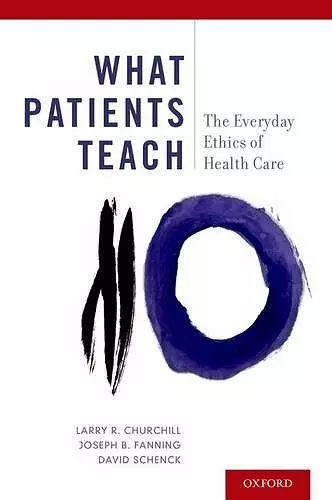What Patients Teach
The Everyday Ethics of Health Care
David Schenck author Larry R Churchill author Joseph B Fanning author
Format:Paperback
Publisher:Oxford University Press Inc
Published:8th Dec '16
Currently unavailable, and unfortunately no date known when it will be back
This paperback is available in another edition too:
- Hardback£44.49(9780199331185)

This insightful book emphasizes the importance of patient perspectives in shaping healthcare ethics, advocating for a more patient-centered approach to care and professional conduct.
In What Patients Teach, the authors explore the often-overlooked perspectives of patients in the realm of healthcare ethics. Traditionally, the voices of healthcare professionals have dominated this field, but this book shifts the focus to the patients themselves. By presenting their insights and experiences, the authors argue that understanding patients' perceptions is crucial for establishing ethical obligations and fostering good care. This patient-centered approach emphasizes the importance of interpersonal relationships in healthcare, highlighting the universal human experience of being a patient.
The book delves into the unique dynamics that arise in patient-provider relationships, suggesting that these interactions can reveal significant ethical lessons. Through detailed analyses of 50 interviews with 58 patients from various backgrounds and illnesses, the authors seek to answer two fundamental questions: What elements contribute to therapeutic relationships with healthcare providers, and what ethical insights can be gleaned from these experiences? The findings underscore the importance of patient vulnerability and clinician responsiveness in shaping the structure and rhythm of routine care.
Ultimately, What Patients Teach advocates for a reformation of healthcare ethics that is informed by patient experiences. It presents a new understanding of care that recognizes the interdependence between patients and providers, highlighting mutual responsibilities. The final chapters propose revised ethical codes for health professionals and discuss the implications for medical education, suggesting that a more patient-centered approach can enhance the ethics of care and improve healthcare outcomes.
This an outstanding contribution to the ethics literature * thoughtful, analytic, original, and exceptionally attuned to the dynamic, 'doubled-agency' aspects of the doctor-patient relationship. Combining profound insight with empirical data gleaned from in-depth interviews, the authors challenge the received wisdom that the abstract framework of principled-centered ethics will suffice to solve clinical problems. All those involved in conducting and teaching ethics consultations will benefit from this book.Larry Schneiderman, Professor Emeritus, Medicine and Family & Preventive Medicine, University of California, San Diego *
The near-universal complaint among disappointed patients is, 'My doctor doesn't listen.' Churchill, Schenck, and Fanning let the patients themselves tell us exactly what it means to listen within the context of a truly therapeutic relationship, thoughtfully describing the unglamorous, everyday world of solid medical practice. Along the way, they force us to rethink many of our assumptions about what most matters ethically in health care. * Howard Brody, John P. McGovern Centennial Chair in Family Medicine and Director, Institute for the Medical Humanities, University of Texas Medical Branch *
What Patients Teach, with its companion volume, Healers, gives health-care professionals the clearest, most practical, best researched guide to relationships with their patients. Few books offer as constructive a vision of what clinical care can be. The authors' concluding call for a reorientation of bioethics to focus on patients' vulnerability deserves to debated and, I hope, implemented. These books are essential reading for anyone concerned with the humane delivery of health care. * Arthur W. Frank, author of The Wounded Storyteller (new edition, 2013) and Letting Stories Breathe *
This is an essential book in medical ethics. Drawing on extensive interviews, the authors emphasize the patient's agency and the body's belonging to a community, and they see the trust that's central to the patient-physician relationship as a reciprocity of vulnerability and responsiveness. This "doubled agency" leads them to a reassessment of principlism; in their view ethical principles are the boundary conditions of that relationship, useful primarily when trust fails. * Kathryn Montgomery, Professor of Medical Humanities & Bioethics and Medicine, Northwestern University *
This is a good resource to highlight the patient perspective for clinicians. The authors allow patient stories to be told with little interruption, preserving an authentic patient voice, and still carry out an effective discussion and analysis of the contributions that these perspectives make to the ethics of healthcare. * Kathryn E. Raliski, MA, Doody's Health Sciences Book Review *
The essential opinions about patients expressed by the physicians in Healers are ineluctably subjective; they are not measurable and cannot be made objective. To comprehend that is to realize also how imperative thoughtful subjectivity is not only to clinical medicine and bioethics but also to how persons live their lives generally. Understand that, and you will begin to be free of scientism outside of its rightful domain. I believe you will come away from these books with an increased appreciation of healing and a wider and more human view of ethics. * Hastings Center Report *
ISBN: 9780190650582
Dimensions: 137mm x 208mm x 15mm
Weight: 272g
208 pages